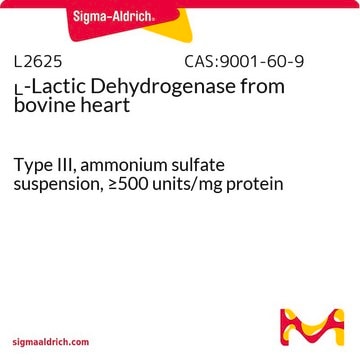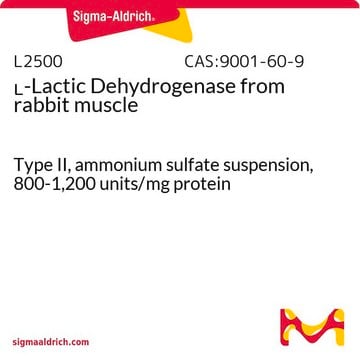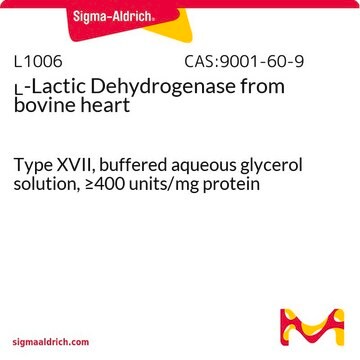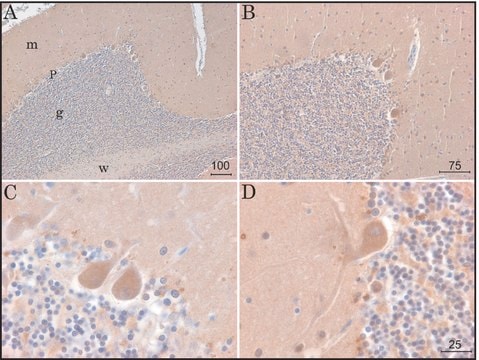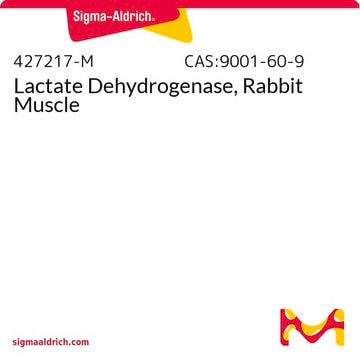L3916
L-Lactic Dehydrogenase from bovine heart
1000 units/mL
Synonym(s):
Lactate, (S)-Lactate: NAD+ oxidoreductase, L-LDH, LAD, LD
Sign Into View Organizational & Contract Pricing
All Photos(1)
About This Item
Recommended Products
form
solution
specific activity
1000 units/mL
storage temp.
2-8°C
Looking for similar products? Visit Product Comparison Guide
General description
LDH (lactic dehydrogenase) is a glycolytic enzyme. It is found in skeletal muscle, heart, liver, kidneys, brain, lungs and red blood cells. It comprises of five isoenzyme forms. LDH possess a tetrameric structure.
Application
L-Lactic Dehydrogenase from bovine heart has been used:
- as a reference standard to measure the LDH (lactic dehydrogenase)
- to quench protein-bound NADH in cells
- to measure the lactate released by the cells in suspension
For use in enzymatic determination of lactate or pyruvate.
Biochem/physiol Actions
LDH (lactic dehydrogenase) helps in the reversible conversion of lactate to pyruvate.
Also catalyzes the oxidation of other L-2-hydroxymonocarboxylic acids.
Unit Definition
One unit will reduce 1.0 μmole of pyruvate to L-lactate per min at pH 7.5 at 37 °C.
Physical form
Suspension in 2.2 M ammonium sulfate
Signal Word
Danger
Hazard Statements
Precautionary Statements
Hazard Classifications
Resp. Sens. 1
Storage Class Code
11 - Combustible Solids
WGK
WGK 1
Personal Protective Equipment
dust mask type N95 (US), Eyeshields, Gloves
Certificates of Analysis (COA)
Search for Certificates of Analysis (COA) by entering the products Lot/Batch Number. Lot and Batch Numbers can be found on a product’s label following the words ‘Lot’ or ‘Batch’.
Already Own This Product?
Find documentation for the products that you have recently purchased in the Document Library.
Customers Also Viewed
Culture Expansion in Low-Glucose Conditions Preserves Chondrocyte Differentiation and Enhances Their Subsequent Capacity to Form Cartilage Tissue in Three-Dimensional Culture
HeywoodHannah K, et al.
BioResearch Open Access, 2484-2494 (2014)
Circulating biomarkers in malignant melanoma
Advances in Clinical Chemistry, 69, 47-89 (2015)
Cardiac, Vascular, and Skeletal Muscle Systems
Haschek and Rousseaux's Handbook of Toxicologic Pathology (2013)
Mitochondrial angiotensin receptors in dopaminergic neurons. Role in cell protection and aging-related vulnerability to neurodegeneration
Valenzuela R, et al.
Cell Death & Disease, 7(10), e2427-e2427 (2016)
Hsiao Ju Chiang et al.
Nature methods, 20(2), 248-258 (2023-01-20)
The expansion of fluorescence bioimaging toward more complex systems and geometries requires analytical tools capable of spanning widely varying timescales and length scales, cleanly separating multiple fluorescent labels and distinguishing these labels from background autofluorescence. Here we meet these challenging
Our team of scientists has experience in all areas of research including Life Science, Material Science, Chemical Synthesis, Chromatography, Analytical and many others.
Contact Technical Service